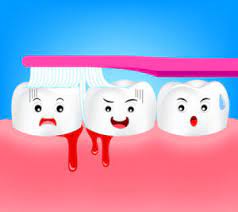
Introduction:
Bleeding gums can be a concerning issue that may indicate an underlying oral health problem. Ignoring this symptom could lead to more serious complications, so understanding the causes, prevention, and treatment options is crucial for maintaining healthy gums and overall oral hygiene.

Causes of Bleeding Gums:
- Gingivitis: The most common cause of bleeding gums is gingivitis, which is the early stage of gum disease. Plaque buildup along the gumline can lead to inflammation and bleeding.
- Poor Oral Hygiene: Inadequate brushing and flossing can cause plaque to accumulate, leading to gum irritation and bleeding.
- Vitamin Deficiencies: Lack of essential vitamins like vitamin C can weaken blood vessels and increase the susceptibility of gums to bleeding.
- Medications: Certain medications, like blood thinners, can contribute to gum bleeding.
- Pregnancy Gingivitis: Hormonal changes during pregnancy can make gums more sensitive and prone to bleeding.
- Medical Conditions: Health conditions like leukemia, diabetes, and bleeding disorders can affect gum health and cause bleeding.

Prevention Strategies:
- Maintain Consistent Oral Hygiene: Brush your teeth at least twice a day and floss daily to remove plaque and food particles from between your teeth and gums.
- Use the Right Technique: Use a soft-bristle toothbrush and gentle circular motions to clean your teeth and gums without causing irritation.
- Balanced Diet: Consume a diet rich in vitamins and minerals, particularly vitamin C, which supports gum health.
- Regular Dental Check-ups: Schedule regular visits to your dentist for professional cleanings and check-ups to catch potential issues early.
- Avoid Tobacco: Smoking and using tobacco products can significantly increase the risk of gum disease and bleeding.
- Manage Stress: High stress levels can weaken the immune system and impact oral health. Practice stress-relief techniques.

Effective Bleeding Gum Treatment:
- Improved Oral Hygiene: If bleeding is due to gingivitis, consistently maintaining good oral hygiene can help reverse the condition.
- Antiseptic Mouthwash: Using an antiseptic mouthwash can help reduce bacteria and inflammation in the gums.
- Saltwater Rinse: Rinsing your mouth with a warm saltwater solution can help soothe gums and promote healing.
- Topical Gels: Dentist-recommended topical gels or ointments can provide relief from gum irritation.
- Professional Dental Cleaning: In cases of persistent bleeding, a dental professional can perform a thorough cleaning to remove plaque and tartar.
- Gum Treatments: For more advanced gum disease, your dentist may recommend scaling and root planing or other specialized treatments.
- Addressing Underlying Issues: If bleeding is related to medical conditions or medications, working with your healthcare provider to manage these factors can help improve gum health.

Conclusion:
Bleeding gums should never be ignored, as they can indicate the presence of underlying oral health issues. By practicing good oral hygiene, adopting preventive measures, and seeking timely treatment, you can effectively address bleeding gums and maintain optimal gum health. Remember, regular dental check-ups and a proactive approach to oral care are key to preventing and treating this common issue.

